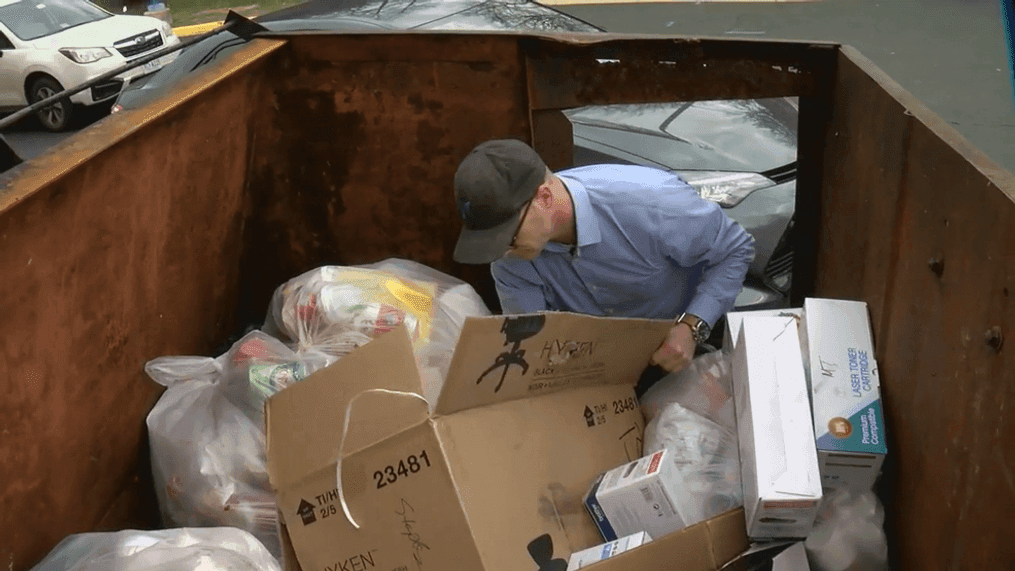Dumpsters: A merchandise mecca and sign of America’s wastefulness
WASHINGTON (WJLA) - America is one of the richest countries in the world.
It is also one of the most wasteful.
WJLA has been tracking trash and discovered some of the most reckless behavior coming from America’s retailers.
“I found it. I told you I’d find you a brand new chair,” exclaimed a beaming Matt Malone as he pulled a flawless, brand new office chair, instructions and bolts out of an Office Depot dumpster.
Malone is a leader in the dumpster-diving movement, where an increasing number of people are supplementing their income, and even making a living, pulling perfectly good treasure from the trash.
Some estimates indicate retailers throw away $50 billion worth of merchandise every year, creating five-billion pounds of waste.
Malone and I wander behind a popular home decorating store and approach a clanking, blue metal container about the size of a semi-truck trailer.
"This is a compactor. You can hear them throwing stuff in the compactor. If you were to open this up, if you were to actually watch this guy, see what he's throwing away, it’s crazy. You'd be shocked," he said.
Clothing, furniture, electronics, power tools, home decor, camping gear– you name it, Malone’s found it, often in perfect condition.
"It's not garbage. A lot of times its new products. I can guarantee you it's not broken. It's very, very wasteful," he said.
And very lucrative for those who know how to find it, and sell it.
In one year, Malone can– and has– cleared more than $100,000 dumpster diving part-time.
If he quit his day-job, he estimates that would go up to about $250,000.
We brought him in from Austin, Texas to show us the ropes. Before one foot hit the pavement, Malone demonstrated how he uses Google Maps to chart his course.
“I'll look for certain stores that I know. For instance, Harbor Freight, something like that. Then I can kind of zoom in on that. I can start to figure out details about their dumpsters. For instance, here's a 3-D view. I can see that they're using a compactor at Michael’s, which means I can't really hit that, but I can go and hit this guy here, which is a full yarder dumpster."
In no time at all, Malone built our route and we were on our way.
A small dumpster behind "Rack Room Shoes" rewards us with brand new Nike NFL jerseys, tags still on. They retail for about $100 each.
Next, we hit what Malone says are typically high-yielding dumpsters behind Michael’s Arts and Crafts.
It's an off day, but we're not empty-handed. A picture frame or two, and a basketball display case.
"So one of your biggest friends in the dumpster is basically your phone. There's barcode scanners you can pull up, just to see what a price is,” says Malone as he scans our latest treasure. “So on Amazon, it's going for $59.49."
I ask him if new divers have unrealistic expectations that every dumpster is a gold mine.
"Yeah,” says Malone. “It's going to be a slow routine. It's like any business, you have to build it. You have to build your contacts up, you have to build your route, you have to build all that.”
More dumpsters, more items. Games, toys, office and party supplies.
“Part of the trick,” he says as he grabs a handful of brand new kid’s trinkets still in the packages, “is knowing where to sell what you find. This is something you're going to sell at a garage sale. But if there's new product, like the jersey with the tag on it, you just put it on Amazon and just wait for it to sell.”
In our few hours out with Malone, we collected about $1,000 in products.
This year it's estimated that Americans will return $380 billion worth of merchandise.
“When you buy something and you take it back to the store, what do you think happens to it?” Malone asked. “They throw it away. It's cheaper for them to just throw it away and get a new product. We have made our society to where we can build products so cheap it's no longer effective to repair. That is a civilization that's scary because you're just wasteful."
Watch an exclusive, behind the scenes interview with Malone for tips and ideas if you want to try your hand at dumpster diving below:



